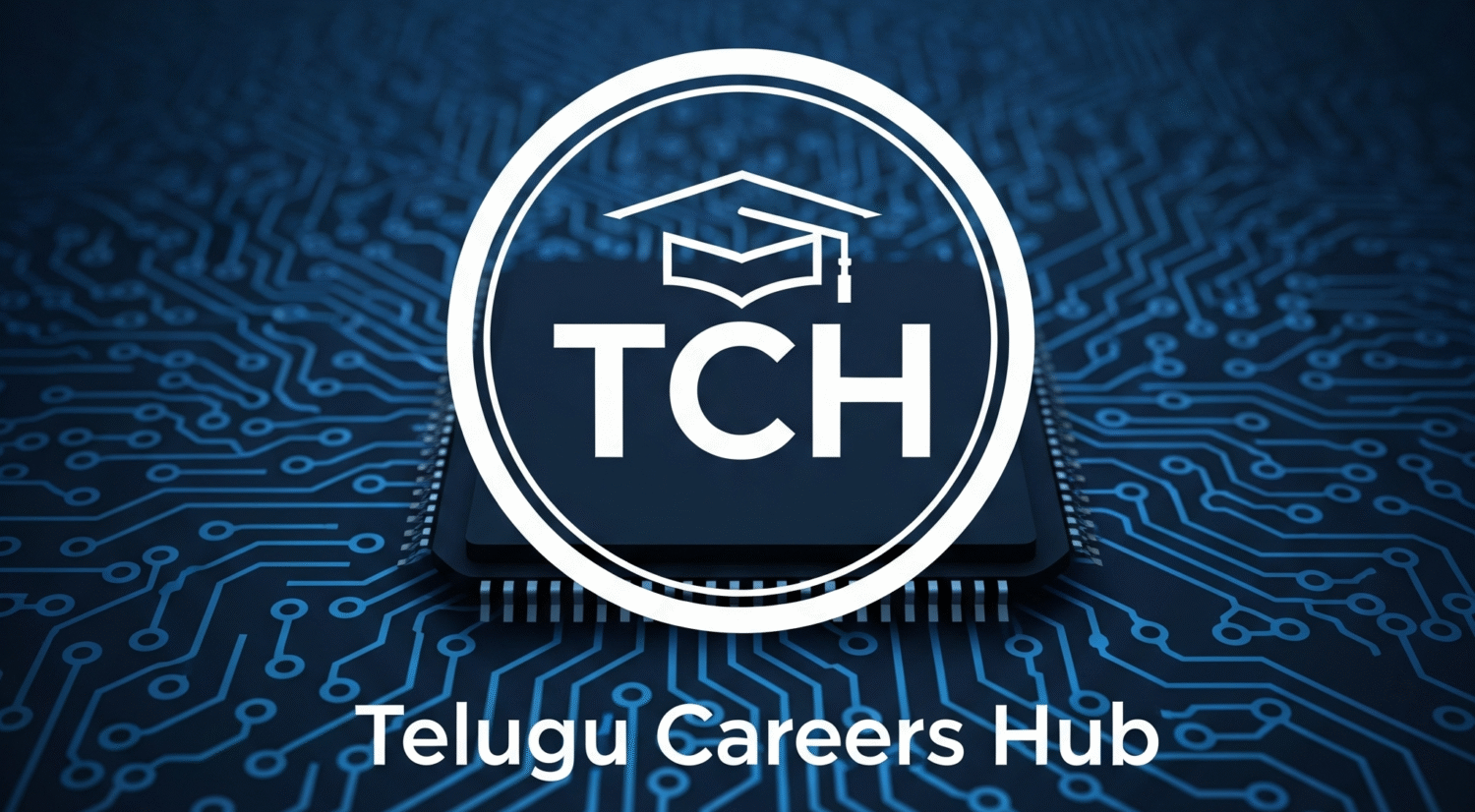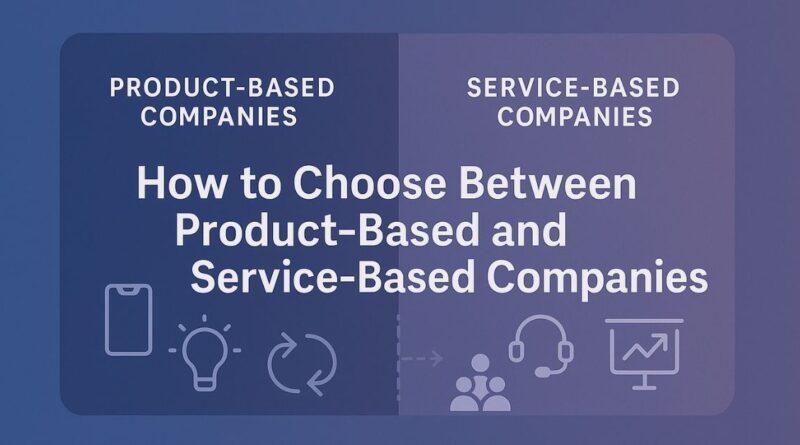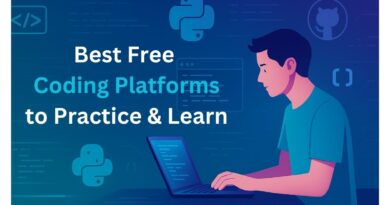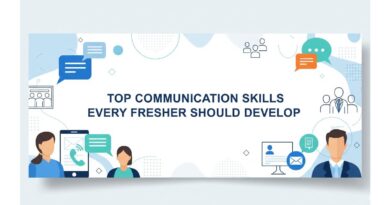🧭 How to Choose Between Product-Based and Service-Based Companies: A Fresher’s Guide to the IT Landscape
🧭 How to Choose Between Product-Based and Service-Based Companies: A Fresher’s Guide to the IT Landscape
🚀 Introduction: The Crossroads of Your IT Career
Starting a career in IT is exciting, but also overwhelming. Among the first big decisions freshers face is choosing between product-based and service-based companies. This decision affects the technologies you’ll use, your learning curve, the salary you’ll earn, and even your day-to-day job satisfaction.
Many freshers apply blindly to all companies that come their way without truly understanding the difference between product and service companies. In this guide, we will break down each aspect in a detailed, digestible manner to help you make a smart, long-term decision for your career.
🔍 What Are Product-Based and Service-Based Companies?
Understanding what each type of company does is the foundation of making the right choice.
🧩 Product-Based Companies
A product-based company is one that develops and sells software products to consumers or businesses. These products could be anything from an operating system to a CRM or a game.
Examples:
-
Google (Search, Android, Gmail)
-
Microsoft (Windows, Office)
-
Adobe (Photoshop, Acrobat)
-
Zoho (CRM, Mail, Projects)
Key Characteristics:
-
Revenue comes from product sales or subscriptions
-
Employees focus on improving and scaling the product
-
Core team works on long-term development
-
High focus on performance, UI/UX, and innovation
🛠️ Service-Based Companies
A service-based company provides IT services to external clients, often based on their requirements.
Examples:
-
Infosys, TCS, Wipro, Accenture, Cognizant
Key Characteristics:
-
Revenue comes from client projects
-
Teams work on custom software development
-
May involve on-site deployments or client interactions
-
Employees switch between different projects and domains
🧭 Section 1: Product vs Service-Based Companies – Key Differences
Understanding the basic product vs service-based companies distinction helps you align your expectations.
🔑 Differences at a Glance
| Criteria | Product-Based | Service-Based |
|---|---|---|
| Business Model | Create and sell software | Offer IT services to clients |
| Revenue Source | Products (one-to-many) | Projects (one-to-one) |
| Tech Stack | Consistent, in-house | Varies by client |
| Project Type | Product features, R&D | Client requests, custom dev |
| Work Style | Autonomy, ownership | Execution, delivery-focused |
| Hiring | Competitive (DSA-heavy) | High volume (aptitude-based) |
| Salaries | Higher starting salaries | Stable increments |
| Work Culture | Start-up style, innovation | Structured, client-focused |
💼 Section 2: What’s the Work Culture Like?
Culture is one of the biggest influencers in job satisfaction.
🌱 Product-Based Work Culture
-
Encourages creativity and experimentation
-
Focus on ownership of features
-
Teams work in Agile, iterate quickly
-
Flexible hours, hybrid/remote options often available
-
Challenging but rewarding environment
📊 Service-Based Work Culture
-
Highly process-oriented
-
Clear team structures and protocols
-
Emphasis on timelines and client communication
-
You may need to work in shifts or relocate
-
Great for those who like stability and structure
💰 Section 3: Salary Expectations – Which Pays Better?
Let’s talk about compensation — something every fresher is curious about.
💸 Product-Based Companies
-
Entry-level salaries range from ₹10–40 LPA (in Tier-1 product companies)
-
Includes bonuses, ESOPs (stock options), and perks
-
Performance reviews tied to contributions and innovation
📉 Service-Based Companies
-
Average fresher salary: ₹3–6 LPA
-
Offers stability and steady growth
-
Some companies provide bonuses and retention benefits
-
Best suited for volume hiring and training programs
🎓 Section 4: Learning & Upskilling Opportunities
In your early career, your learning curve is everything.
📘 Product Companies Offer:
-
Deep focus on coding, system design, and scalability
-
Opportunities to work on real-time issues
-
Learn from senior engineers and mentors
-
Encouraged to contribute to open-source and patents
📗 Service Companies Offer:
-
Training in multiple technologies and domains
-
Good for learning project management and teamwork
-
Certifications and client exposure
-
Rotations help understand industry workflows
🌐 Section 5: Career Growth Path – Long-Term Perspectives
Which company type supports your ambitions in the long run?
🚀 Product-Based Growth Path
-
Clear roadmap: SDE → Senior Engineer → Architect/PM
-
Fast growth if you’re proactive and innovative
-
Many engineers turn into startup founders or tech leads
-
Niche expertise opens global opportunities
🛤️ Service-Based Growth Path
-
Structured growth: Trainee → Associate → Manager → Delivery Head
-
Balanced mix of tech and management
-
Internal transitions to sales, HR, or training
-
Safe choice for long-term planners
🧪 Section 6: Tech Stack and Projects – What Will You Work On?
The kind of technologies and projects you touch early on defines your career interests.
🔧 Product-Based Companies
-
Work on latest languages and frameworks
-
Develop in-house tools or microservices
-
Full ownership from backend to deployment
-
Projects last months to years
🔨 Service-Based Companies
-
Work across Java, .NET, Python, SAP, etc.
-
Must adapt to client-required tech stacks
-
Short project cycles: weeks or months
-
Greater exposure to legacy and enterprise systems
🛂 Section 7: Interview Process – What to Expect?
How do these companies screen candidates?
🧠 Product-Based Interview Process
-
Coding rounds on LeetCode, HackerRank, etc.
-
Strong focus on Data Structures & Algorithms
-
System design (for lateral roles)
-
Behavioral interviews to test culture fit
📋 Service-Based Interview Process
-
Aptitude tests: Quant, Reasoning, Verbal
-
Basic coding (C, Java, Python)
-
Communication or GD rounds
-
HR and technical discussion based on resume
📌 Section 8: Best Company Type for Freshers – Which One Suits You?
Your strengths and goals should guide your decision.
👤 Choose Product-Based If You:
-
Enjoy solving complex programming problems
-
Want to grow as a developer or architect
-
Are comfortable with fast-paced environments
-
Aim for higher initial pay and deeper tech skills
👤 Choose Service-Based If You:
-
Want to learn client interaction and delivery processes
-
Prefer structured training and onboarding
-
Are open to switching domains and tools
-
Need a more stable and less intense work culture
🏢 Section 9: Product-Based Companies for Freshers in India
Looking for companies to target? Here are some product-based companies for freshers in 2025:
💼 Indian Product-Based Companies
-
Zoho – Great place to start, innovation-heavy
-
Freshworks – SaaS-based, Chennai HQ
-
Razorpay – Fintech revolution, deep engineering roles
-
InMobi, Postman, Meesho – Startup culture, fast growth
🌍 Global Giants with Indian Offices
-
Google – Cutting-edge innovation, competitive hiring
-
Microsoft – Development + research roles
-
Adobe – Creative software ecosystem
-
Amazon – Large-scale systems and e-commerce logic
🔁 Section 10: Can You Switch Between the Two Later?
Absolutely. Many professionals begin in one and migrate to the other.
🔄 Switching from Service → Product
-
Build a strong coding profile (LeetCode/GitHub)
-
Contribute to open-source or side projects
-
Learn system design and DSA
-
Use platforms like LinkedIn, AngelList, referrals
🔁 Switching from Product → Service
-
Highlight project management and teamwork
-
Certifications like PMP, ITIL, Agile
-
Emphasize domain knowledge and delivery experience
✨ Bonus Section: Myths vs Reality
Let’s bust some myths that confuse freshers:
❌ Myth: Product companies are always better
✅ Reality: Not if you aren’t prepared for coding rigor
❌ Myth: You can’t grow in service companies
✅ Reality: You can reach VP or Director roles with the right path
❌ Myth: Product companies don’t hire freshers
✅ Reality: Many product startups now hire directly from campuses and online platforms
✅ Final Thoughts: Choose a Path, Not a Label
There is no universal best option. Your decision should be based on:
-
Your learning goals
-
Comfort with coding vs client handling
-
Long-term vision (tech mastery vs managerial roles)
Regardless of where you start, your skills, attitude, and continuous learning are what truly define your IT career success.
Follow us for more Updates: Telugu Careers Hub




